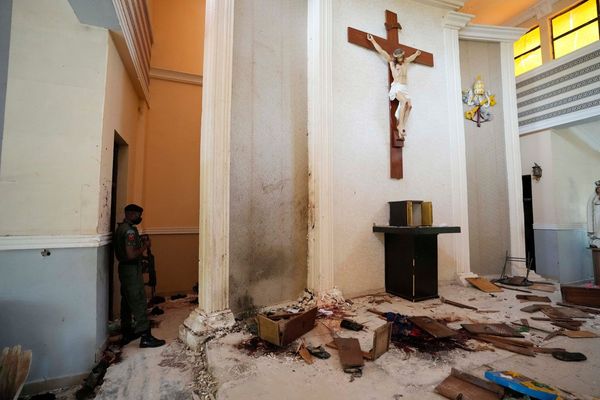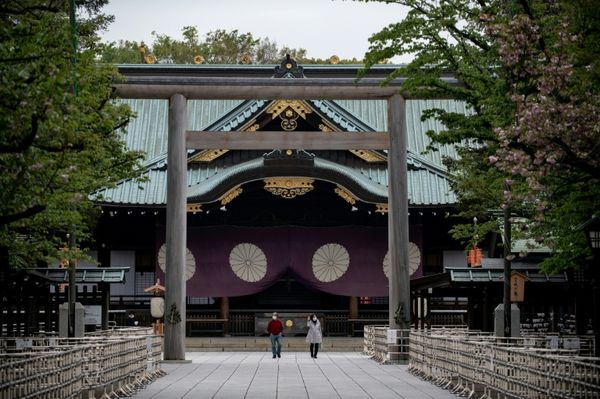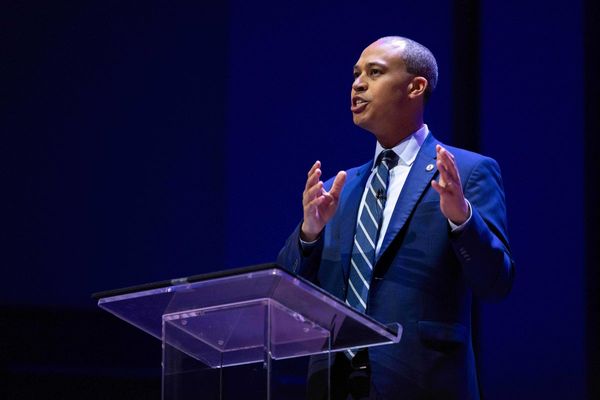
Phnom Penh
Hun Sen is pacing along a carpet like a nervous teenager waiting for a date. Cambodia’s strongman is perusing flower arrangements, checking what appears to be a gold-encased smart phone. Friends are coming over. The gala dinner of the Asean summit is being staged in an enormous ballroom. The carpet is red, embossed with gold motifs. Lights the shape of triffids dangle over the heads of guests.
Anthony Albanese arrives, decked out in a closely fitted emerald green and gold silk jacket. Sen is not an unknown quantity for Australia’s prime minister. The two met in the late 1980s when Albanese was a political staffer and the Cambodian had just shifted from the military to politics. There’s a connection point to draw on, and the greeting is cordial.

The reception line is gathering pace. The premier of China, Li Keqiang, sweeps in with a substantial entourage. While Li poses for the world’s cameras, the entourage decouples and walks with purpose towards the ballroom. The Cambodians intercept the group. A very minor fracas plays out stage left. Some of the Chinese officials read the room and retreat, some continue into the room.
The arrivals keep coming. Bong Bong Marcos dazzles in pink. Joko Widodo in tangerine. A shift in the barometric pressure heralds the arrival of Joe Biden.
Biden, in grey silk, wafts towards his host like a cumulus cloud. Like Li, Biden is accompanied by a substantial entourage that makes straight for the ballroom door. A replica micro scuffle ensues at the entrance. Burly military types with briefcases respond by picking up their pace and vanishing into the ballroom as Biden grips and grins.
I’m keeping watch because I suspect Albanese will encounter Li at some point during the evening. All the diplomatic signals for more than a week point to imminent leader-level dialogue between Australia and China – the first in several years. High level talking generally begins with a precursor rendezvous.
The route to the interior of the ballroom takes me past the Beast idling in Biden’s motorcade. Once I’m in the room, the futility of my lookout plan becomes clear.
The dignitaries will be down the front. I am right at the back, and can’t roam freely without creating an absolute ruckus. There’s no way I’ll have an unimpeded line of sight. Albanese is one of the first of the dignitaries into the ballroom, surrounded by a big group. Peers trail after him. Jacinda Ardern, then Justin Trudeau, who has a sixth sense about where the cameras are. Biden brings up the rear. I’ve lost a visual on Li.
I accept defeat and depart the venue shortly before Albanese meets the Chinese premier at the front of the ballroom and exchanges the first words between the two countries at leader level since 2019. The Seven Network political editor, Mark Riley, is offsite watching a live feed from the host broadcaster. He spots a tête à tête visible for a few seconds. As I arrive back at the hotel, I pass Riley striding out into the sauna of downtown Phnom Penh ready to break the news for any hardcore viewers up at the crack of dawn on Sunday. Australia has inched out of the diplomatic deep freeze. We all scramble to report that shift from the moment our bleary eyes open.
With detente in play Albanese meets Biden to compare notes. Biden has his own meeting scheduled with Xi, the first face-to-face chat of his presidency. The arrival and departure from Albanese’s Biden catch-up is a bit chaotic. It’s unclear if there are usable images. After comparing notes about China, Aukus and climate change, Albanese asks Biden whether they can linger for a stroll long enough to capture pictures. Biden obliges.

It’s interesting watching these two together. Biden is very obviously a north Atlantic, 20th century man, much older than the prime minister, a different generation. But they share some common mannerisms. Albanese is light on his feet, like Biden. They both have emotional intelligence, a quality perennially underestimated people often develop. Their polish isn’t absolute. They present like politicians who have long resisted being buffed into absolute blandness by their backrooms before submitting with gritted teeth to the verbal discipline required to win high office.
Some days they fall off the talking points wagon. Or want to, but resist.
Bali, part one
After Biden, we are en route to the G20. We all know Albanese must be meeting Xi. Penny Wong has been carefully lining up this G20 moment with China’s foreign minister, Wang Yi, for months. I find out later Wong locked in the arrangements with Yi before we left Australia last Friday.
But right now, there’s collective stress in the press pack because we can intuit something significant coming that we can’t yet verify. The polite stonewalling from Team Albanese is resolute. During a summit briefing on the plane, we ask what can be known about any Xi meeting. Nothing, is the answer.
When the plane lands, we taxi past the aircraft of the Chinese delegation and tuck in beside Air Force One. Equatorial heat blasts as we wobble downstairs to the tarmac, and embassy staff herd us in the direction of the waiting motorcade. We’ve left three reporters and some cameras back on the tarmac to throw a few questions at Albanese on the record in time for TV and print deadlines. We hurl our bags and sweating bodies in vans and get the TV guys to play the sound out live.
Cool as a cucumber, Albanese greets his Balinese arrival party, strides down the red carpet, looks down the barrel of the camera and confirms he is meeting Xi at the G20.

An absolute frenzy of filing from moving vehicles ensues. The TV guys persuade the drivers to pause in a sidestreet so they can cross live into the evening news at home.
We learn later that Australia and China had agreed on a precise time to confirm the meeting, so the plane withholding was hard-nosed diplomacy rather than gratuitous cat-and-mouse with the press pack.
But I can visualise Albanese chuckling after his audacious mic drop, visualising the inelegant scramble afterwards. Keep them dancing – an Albanese mantra for as long as I’ve known him.
Beijing, via Bali
Albanese calls on Xi at a luxury venue inside the lair of the G20 leaders. If this were production design, the director’s note for the set would read: tasteful tropical opulence.
Security is tight. Officials in KN95 masks printed with the Chinese flag greet visitors with bag scanners and a thermal imaging camera to check the temperature of arrivals. This is a Covid precaution, but the metaphor felt fitting enough. Xi is already in the room when Albanese arrives with the head of his department and his national security team.
Xi walks to a designated greeting position and the two leaders smile, shake hands and turn to the cameras. The grip-and-grin ritual is a rictus of forced formality unless it’s punctured with a bit of easy chemistry. Albanese tries to engage his host during the handshake. A bit of eye contact. A breath of spontaneity. Xi continues smiling but stares resolutely at the camera rather than his guest.

The leaders take their seats to deliver opening remarks. Xi speaks first. The president tells Albanese the relationship needs to be “cherished by both sides”. Continuing the present estrangement would jeopardise “peace and development in the Asia-Pacific region and the world”. Xi recommends the two leaders assess their recent experience and then discuss “how to push bilateral relations back on the right track and move forward sustainably”. The president notes the prime minister has promised to conduct the relationship with maturity.
Albanese responded, and Xi watched him steadily. At one point, the Chinese president made notes. Albanese tells us later he raised all the irritants in the relationship – the damaging trade sanctions, the detention of Australians. But his overarching purpose was stabilising the relationship.
The meeting is a diplomatic coup, the culmination of months of precision planning. But any substantive breakthrough will be even harder work. This feels like a big moment regardless. The direction of travel has changed. There is a new flight path.
But then an explosion in a Polish village near the Ukrainian border that kills two civilians sucks all the oxygen out of the room. Leaders summon their advisers. Lights across the luxury villas of Nusa Dua burn well into the night.
Poland, via Bali
Joko Widodo is looking a little forlorn out in the mangroves. G20 leaders were supposed to be with him, inspecting the Hutan mangrove forest. But the Indonesian president is alone because G7 leaders, summoned by Biden, are in a conclave in the Grand Hyatt, assessing what just happened. Early reports had a Russian missile exploding in Poland; a dangerous escalation if true.
I’m sure the Bali G20 has one of those bland aspirational themes, but this summit is actually about danger. Carnage in Ukraine and an accompanying global energy crisis. Instability and the risk of lethal miscalculation in the Indo-Pacific. Viewed through an Australian lens, there are two G20s; one with an eye to our world, the rising region, the other mired in the feuds of the old world. Biden and Xi ease around each other gingerly at the point where these worlds intersect. The old world wants China to use its no-limits partnership to influence Vladimir Putin. The rising world fears China is our Russia.
Widodo continues to inspect the mangroves, buying time while the G7 cohort assesses the known knowns. Journalists back in the G20 media centre, and in the pools shadowing the dignitaries, wonder whether misadventure in Poland will escalate into a counterattack because of the Nato principle that an attack on one member is an attack on them all.
High stakes – and we are shadowing a group of leaders contemplating life and death, war and peace, while locked down in a luxury enclave on an Indonesian island. This group has the power to shape the future with a single decision. It feels fascinating, and at the same time oddly disconcerting, to be sealed inside this bubble with them.
Further setting teeth on edge, Donald Trump is about to flag another presidential run. A live feed of Widodo’s mangrove excursion is accompanied by a soothing voiceover from Miss Indonesia 2020, Putu Ayu Saraswati. “This area used to be a fish pond,” she says, her voice like silk, while we wait for guidance on the likelihood of world war three.
Biden wraps his G7 huddle and tells waiting journalists it’s possible the explosion in Poland wasn’t a hostile act. From that point, the crisis begins to deescalate, but the adrenaline lingers. Widodo’s mangrove inspection is back on after a four-hour delay.
The leaders speed out in their EV motorcades and join the Indonesian president. Most are now in white polos embossed with a G20 logo. Emmanuel Macron has declined the polo, which feels entirely on-brand. Albanese is decked out in the full uniform: polo, baseball cap, sunglasses. Back in the media centre we half watch Trump pumping up his tyres in Florida on our social media feeds. His nihilistic narcissism feels an order of magnitude more repugnant in the presence of serious people, hoping for the best, while grappling with the impossible.

Xi doesn’t appear in the Hutan forest. The Russian foreign minister, Sergey Lavrov, having berated everyone, and been berated by everyone, from Cambodia to Bali, has fled the scene. Biden finally disembarks at the mangroves in shirtsleeves. “You’ve got some real nice biceps,” the president notes after sizing up one of the cameramen. The heat is blazing in the middle of the day – the buildup before the afternoon downpour that will flood the streets of the resorts, scattering the delegations buzzing around on electric golf carts with their briefing packs.
Deep in the mangroves a band is playing instrumental versions of Bon Jovi and Red Hot Chili Peppers songs. It’s a Wonderful World gets an outing. Biden climbs some stairs to join his peers. He stumbles. Widodo steadies him.
Bangkok, via Phnom Penh, via Myanmar
During our final hours in Bali, wire services break the news that the Australian academic Sean Turnell is coming home. Turnell had served for several years as an adviser to the democratically elected civilian government of Myanmar before being detained shortly after the military coup in 2021, then imprisoned for violating the Official Secrets Act.
Back in Phnom Penh, Albanese lobbied the Cambodian and Vietnamese prime ministers to help Australia free Turnell. This Asean diplomacy was carried out in plain sight, but it was overshadowed by the prime minister’s precursor conversation with the Chinese premier.
By late Thursday night, Albanese is clearly exhausted and battling a cold, but summit season rolls on. He is energised by another diplomatic breakthrough. He shares the good news shortly after our arrival in Bangkok. “Occasionally in this job you have a big moment, and I’ve just spoken to Sean Turnell who has been released from 650 days of unfair, unjust imprisonment in Myanmar and he has now landed and is well in Bangkok,” Albanese enthuses.

He’s genuinely ebullient that a good man won’t have to spend another night as a political prisoner. One of the officials travelling with us looks as if she might cry. She’s profoundly moved by what’s just happened. Looking at her, I stop frantically assembling words on my screen so I can be in the moment, and remember something important.
We’ve hovered on the periphery of the worst of the world this week. We’ve seen good faith and bad faith actors up close.
But what we’ve witnessed is the world trying to work. Sometimes it does, and sometimes it doesn’t.
But if you can’t save the world, maybe you can save one worthy soul from the indignity of being an arbitrary political prisoner of a military junta. Perhaps you can restore the freedom of a person who has become a pawn in a geopolitical grand narrative.
The world is dangerous. But the flip side of danger is hope.
Additional reporting for the meeting with Xi Jinping by Katina Curtis, political editor of the West Australian, the pool journalist for the bilateral, and the White House press pool for Joe Biden’s excursion to the mangrove forest.







